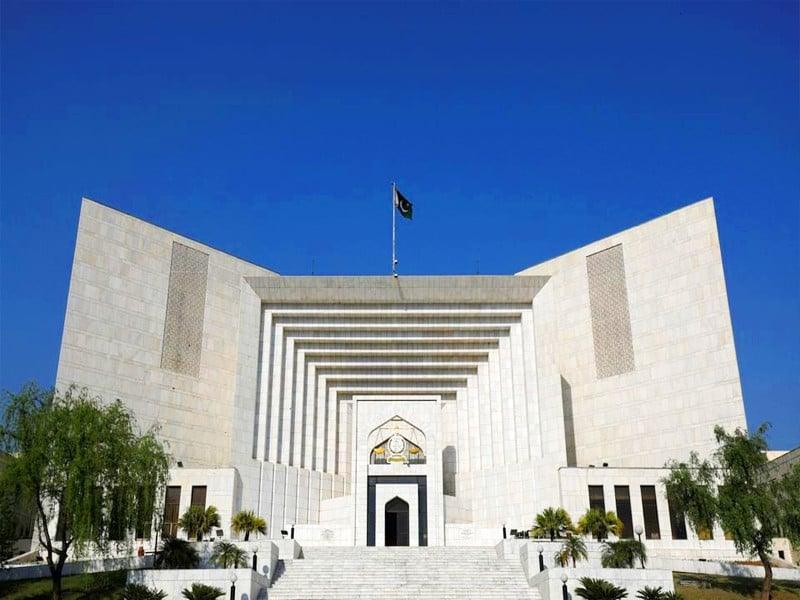Islamabad:
The committee, which was set up in accordance with Supreme Court Practice and Procedure, has made the office with functioning Chief Justice of Pakistan (CJP) ineffective by adopting a procedure.
Committee – Led by Chief Justice of Pakistan (CJP) Yahya Afridi and consisting of Justice Syed Mansoor Ali Shah and Justice Aminuddin Khan – on May 29, made a new procedure to regulate his business.
A notification has been issued in this regard by Supreme Court Registrator Muhammad Saleem Khan. The same review has also been uploaded on the Supreme Court site this week.
The message said the Supreme Court (practice and procedure) the law, 2023, has been changed to the Committee on the powers of the Constitution of Benches and Powers previously exercised by CJP.
It stated that the Supreme Court (practice and procedure) Act, 2023 is not extensive to deal with many eventualities such as emergencies and the absence of CJP to be abroad. “It is necessary to regulate such cavities that are not covered by the Supreme Court (practice and procedure), 2023”. Therefore, in the exercise of the powers awarded in Subsection 2 of section 2 of the Supreme Court (practice and procedure), 2023, the committee conducted a procedure to regulate its business.
The message stated that these procedures can be called the Supreme Court (practice and procedure) committee procedure, 2025, which comes into force at once.
Procedure 1 of the procedure states that the chairman, CJP, must convene the committee’s meeting when needed, physically or in a virtual manner for constitution and reconstitution of benches.
Procedure 2 of the procedure states that at least two members must form a meeting of a meeting of the committee. Determination 4 states that the committee constitutes and reconstitutes benches when required at regular intervals, preferably monthly or every week.
“When completed and issued, no change must be made as specified in accordance with these procedures. Any change in the committee’s constitution, including amendment to the chairman or a member, must not invalid the constitution of benches completed by the committee,” it says.
Determination 5 says that every time the chairman – CJP – continues abroad or is not available to the chairman to chair the meeting, he may constitute a special committee to deal with questions relating to the reconstitution of benches if any of the urgent situations arise as sudden illness or absence of a judge, death or turnover of a judge.
The special committee will be strictly limited to clock suits and recorded in writing, indicating reasons. Such a temporary change is reported to the committee at its next meeting.
Determination 6 says that the SC registrar must keep registration of all meetings, decisions and changes.
Determination 7 says that these procedures should take effect regardless of anything against the opposite in other rules for the time being in force. Determination 8 says the committee can change these procedures from time to time as considered necessary.
Some legal experts believe that clause 5 in newly notified Supreme Court Practice and Procedure Committee Procedure 2025 is in violation of constitutional provision and the purpose of this procedure is to make the office to act CJP superfluous.
Former Lahore High Court judge Shahid Jamil said that Rule 5 of the Supreme Court (practice and procedure) committee procedure, 2025 is in direct conflict with Article 180, which deals with the appointment of functioning CJP, especially when the current supreme judge is absent from Pakistan.
“It is up to the president to appoint the functioning CJP who must be the highest judge of the Supreme Court. Most importantly, the acting CJP must act as CJP during the absence.
Shahid Jamil said that Rule 5 approves for the treatment of a special committee if the chairman of the committee is abroad or is not available. “The law has not used the word’s chairman of the committee, only CJP has been made one of the members together with the supreme judge of the Supreme Court and the Constitution Bench.
In the absence of CJP, the most senior judge would, upon appointment as functioning CJP, perform all the features and exercise all powers in CJP, ”he added.
Some legal experts said the committee led by CJP Afridi has exclusive power to decide the cases that will be referred to constitutional benches for assessment.
However, the committee led by CJP Afridi and consisting of Justice Shah and Justice Khan has been superfluous as a regular meeting is not held to discuss the bench constitution.
Sources revealed to Express Pakinomist that there has been virtually no committee meeting since Justice Afridi took responsibility as CJP. Perhaps there was only one committee meeting on May 29, when the procedure was approved by the committee members.
Sources said there is no discussion or debate about how cases are marked and benches made.
Some senior lawyers wonder why two senior judges consider division benches, while junior judges are part of three-members benches.
It is learned that only the proposed list is sent to committee members for approval. During CJP Afridi’s mandate period, no minutes of committee meetings were uploaded at the SC site.
When he talked about the purpose of the procedure, a lawyer said it was mainly done to introduce clause 5, where it is elaborated that CJP will form a special committee to deal with the cases in his absence.
He said the recipients of the 26th constitutional change are very nervous about leaving cases in the hands of a functioning CJP. “Under the current constitution, justice will Syed Masoor Ali Shah be the functioning CJP. They fear that Justice Shah as the functioning CJP can do something that will cause problems for them.”
Justice Shah has worked as the functioning CJP twice in the recent past. A section of lawyers questions why Justice Shah approved the procedure, which is in violation of the Constitution. Maybe he did not respond when clause 5 of the procedure is directly related to him, a lawyer said.



